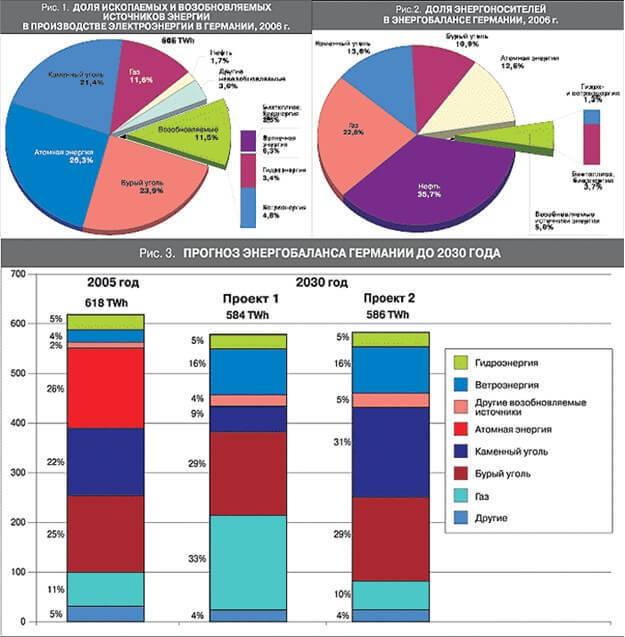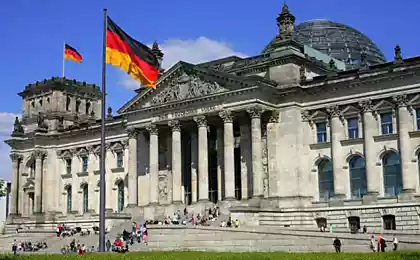433
Energy efficiency in Germany
Main priorities in energy conservationthe Most important contribution to the development of energy-saving technologies has made Germany, in particular it is a leader in the field of wind energy, on the territory of the country has 20,000 wind turbines with a total capacity of 24 thousand MW, accounting for a third of all electricity generated across the country, for comparison, the Sayano-Shushenskaya hydroelectric power station generates 6.4 thousand MW, about 70% of world exports of wind turbines is accounted for by Germany.

Great attention in Germany is paid for solar energy on the roofs of administrative buildings is planned to accommodate 100, 000m2 of solar panels, only in Berlin. No matter what, Germany is a country characterized by rather low indicators of the presence of active Sunny days only for 9 June, the country has developed 23,1 GWh of electricity obtained from solar cells, it amounted to half of the total daily energy consumption of the whole country and was a world record.
After the accident at the nuclear power plant Fukushima-1, Germany abandoned nuclear power, part of nuclear power plants, 8 power plants, were closed immediately, the remaining 9 will stop working until 2022. Introduction of energy saving technologies in Germany is funded by private investors, not government.

The housing sector, the application of the rehabilitation of housingUnder a law passed by the EU Parliament от2001 years, all buildings have an "energy passport" which indicated the rate of consumption of energy buildings, the annual amount of energy includes: hot water, ventilation, heating, ventilation, air-conditioning, water heating, in accordance with these indicators in the passport category is selected for energy efficiency:
A–30 kWh / m2 per year. – 50 kWh / m2 per year. S – 70 kWh / m2 per year. D — 90 kWh / m3 per year in 2030 it is planned to reduce power consumption by up to zero measure, using solar and wind generators, heat pumps, energy-saving technologies in construction.The greatest effect in energy saving is obtained by considering thermal energy individually to each user, the management of Federal programs and compulsory education of citizens in energy efficiency issues.
Housing in Germany is obliged to carry out complex readjustment of existing buildings, comprising of technical, economic, social, and financial analysis that contributes to the improvement of energy efficiency of the house.Sanitation of houses in Germany is done without relocation of tenants. In anticipation of the construction work is going package from project work, which contributes to the creation of a business plan and framework for the creation of an integrated concept of rehabilitation.
To complete energy-related renovation includes the following steps:
Changing the roof covering and insulation of the attic space of the building. Improving the insulation of the facade. Insulation of the ceiling of the basement. Complete replacement of the heating system with water risers. Improving house ventilation. Replacement of Windows and balcony doors for a better option. The integration of heat recovery. Replace apartment door, porch and stair sections. Thanks to the Federal program, Germany hopes to create housing energy efficient homes, with energy consumption from 55 to 70 kWh/m2 per year. published
Source: enargys.ru/energosberezhenie-v-germanii/

Great attention in Germany is paid for solar energy on the roofs of administrative buildings is planned to accommodate 100, 000m2 of solar panels, only in Berlin. No matter what, Germany is a country characterized by rather low indicators of the presence of active Sunny days only for 9 June, the country has developed 23,1 GWh of electricity obtained from solar cells, it amounted to half of the total daily energy consumption of the whole country and was a world record.
After the accident at the nuclear power plant Fukushima-1, Germany abandoned nuclear power, part of nuclear power plants, 8 power plants, were closed immediately, the remaining 9 will stop working until 2022. Introduction of energy saving technologies in Germany is funded by private investors, not government.

The housing sector, the application of the rehabilitation of housingUnder a law passed by the EU Parliament от2001 years, all buildings have an "energy passport" which indicated the rate of consumption of energy buildings, the annual amount of energy includes: hot water, ventilation, heating, ventilation, air-conditioning, water heating, in accordance with these indicators in the passport category is selected for energy efficiency:
A–30 kWh / m2 per year. – 50 kWh / m2 per year. S – 70 kWh / m2 per year. D — 90 kWh / m3 per year in 2030 it is planned to reduce power consumption by up to zero measure, using solar and wind generators, heat pumps, energy-saving technologies in construction.The greatest effect in energy saving is obtained by considering thermal energy individually to each user, the management of Federal programs and compulsory education of citizens in energy efficiency issues.
Housing in Germany is obliged to carry out complex readjustment of existing buildings, comprising of technical, economic, social, and financial analysis that contributes to the improvement of energy efficiency of the house.Sanitation of houses in Germany is done without relocation of tenants. In anticipation of the construction work is going package from project work, which contributes to the creation of a business plan and framework for the creation of an integrated concept of rehabilitation.
To complete energy-related renovation includes the following steps:
Changing the roof covering and insulation of the attic space of the building. Improving the insulation of the facade. Insulation of the ceiling of the basement. Complete replacement of the heating system with water risers. Improving house ventilation. Replacement of Windows and balcony doors for a better option. The integration of heat recovery. Replace apartment door, porch and stair sections. Thanks to the Federal program, Germany hopes to create housing energy efficient homes, with energy consumption from 55 to 70 kWh/m2 per year. published
Source: enargys.ru/energosberezhenie-v-germanii/
Sergey Bubnovsky: pain spine? Discard the poultice and do gymnastics
The taking statins can cause amnesia























